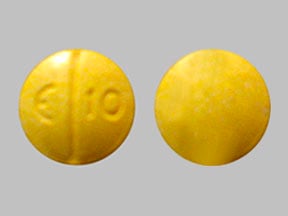
Sulindac Coupons & Savings Card – Discount Prices from $12.96
Sulindac is a nonsteroidal anti-inflammatory drug (NSAID) designed to alleviate pain, swelling, and stiffness associated with various forms of arthritis, including osteoarthritis, rheumatoid arthritis, ankylosing spondylitis, and gouty arthritis. It is also effective in treating shoulder conditions such as acute subacromial bursitis and supraspinatus tendinitis. Sulindac works by inhibiting the body's production of certain natural chemicals responsible for inflammation, thereby reducing pain and swelling. It is recommended to use the lowest effective dose for the shortest duration to minimize the risk of serious side effects, including stroke, heart attack, and stomach bleeding. Always consult with your healthcare provider for advice tailored to your specific health needs and before starting any new treatment.
Our coupons are free to use. Before paying, show the pharmacist your Sulindac savings card to get your free discount. Use our filters below to edit the prescription box to match your needs. The Sulindac prices will update based on your prescription needs. Above our Sulindac coupons, you can change your location to see pharmacy prices and costs in other areas. We're here to help you buy Sulindac at the lowest price with our prescription discount card.
My prescription
Edit
150MG, Sulindac (60 Tablets)
Select pharmacy

CVS
$27.89
COUPON PRICE
Walmart
$12.96
COUPON PRICE
Albertsons
$15.09
COUPON PRICE
Walgreens
$19.80
COUPON PRICESulindac savings card
Show this card to your pharmacist
Walmart
$12.96
BIN
ID
PCN
GRP
019876
LH5A63819D
CHIPPO
LHX
Powered by
Sulindac is a nonsteroidal anti-inflammatory drug (NSAID) designed to alleviate pain, swelling, and stiffness associated with various forms of arthritis, including osteoarthritis, rheumatoid arthritis, ankylosing spondylitis, and gouty arthritis. It is also effective in treating shoulder conditions such as acute subacromial bursitis and supraspinatus tendinitis. Sulindac works by inhibiting the body's production of certain natural chemicals responsible for inflammation, thereby reducing pain and swelling. It is recommended to use the lowest effective dose for the shortest duration to minimize the risk of serious side effects, including stroke, heart attack, and stomach bleeding. Always consult with your healthcare provider for advice tailored to your specific health needs and before starting any new treatment.
Our coupons are free to use. Before paying, show the pharmacist your Sulindac savings card to get your free discount. Use our filters below to edit the prescription box to match your needs. The Sulindac prices will update based on your prescription needs. Above our Sulindac coupons, you can change your location to see pharmacy prices and costs in other areas. We're here to help you buy Sulindac at the lowest price with our prescription discount card.
Related NSAIDs prescriptions
More prescriptions for rheumatoid arthritis
coupons from$19.83Save 80%
coupons from$983.22Save 62%
coupons from$186.58Save 49%
coupons from$14.89Save 67%
coupons from$9.65Save 78%
coupons from$7.84Save 63%
coupons from$21.67Save 35%
coupons from$5.98Save 87%
Related NSAIDs prescriptions
Naprosyn Save 74%coupons from $6.55
Zorvolex Save 93%coupons from $55.74
Elyxyb Save 74%coupons from $132.35
Indocin Save 89%coupons from $467.32
Salsalate Save 60%coupons from $26.66
Cambia Save 97%coupons from $89.85
Bromsite Save 80%coupons from $87.84
Daypro Save 49%coupons from $32.68
More prescriptions for rheumatoid arthritis
Dexamethasone Intensol Save 80%coupons from $19.83
Enbrel Save 62%coupons from $983.22
Tolectin 600 Save 49%coupons from $186.58
Solu-medrol Save 67%coupons from $14.89
Ft Arthritis Pain Save 78%coupons from $9.65
Aspirin Save 63%coupons from $7.84
Cortef Save 35%coupons from $21.67
Celebrex Save 87%coupons from $5.98
Sulindac dosage forms
Use our Sulindac 150MG coupon with prices from $12.96 for 60 Tablets. You can also use our Sulindac 150MG coupon with prices from $4.24 for 10 Tablets. We have a Sulindac 150MG coupon with prices from $4.94 for 14 Tablets. You can use our Sulindac 150MG coupon with prices from $5.12 for 15 Tablets.
Dosage Quantity Price from Per unit 150MG 60 Tablets $12.96 $0.22 150MG 10 Tablets $4.24 $0.42 150MG 14 Tablets $4.94 $0.35 150MG 15 Tablets $5.12 $0.34 150MG 20 Tablets $5.99 $0.30 150MG 30 Tablets $7.73 $0.26 150MG 100 Tablets $26.44 $0.26 150MG 500 Tablets $106.20 $0.21 200MG 10 Tablets $4.68 $0.47 200MG 14 Tablets $5.55 $0.40
| Dosage | Quantity | Price from | Per unit |
|---|---|---|---|
| 150MG | 60 Tablets | $12.96 | $0.22 |
| 150MG | 10 Tablets | $4.24 | $0.42 |
| 150MG | 14 Tablets | $4.94 | $0.35 |
| 150MG | 15 Tablets | $5.12 | $0.34 |
| 150MG | 20 Tablets | $5.99 | $0.30 |
| 150MG | 30 Tablets | $7.73 | $0.26 |
| 150MG | 100 Tablets | $26.44 | $0.26 |
| 150MG | 500 Tablets | $106.20 | $0.21 |
| 200MG | 10 Tablets | $4.68 | $0.47 |
| 200MG | 14 Tablets | $5.55 | $0.40 |
| 200MG | 15 Tablets | $5.77 | $0.39 |
| 200MG | 20 Tablets | $6.86 | $0.34 |
| 200MG | 28 Tablets | $8.61 | $0.31 |
| 200MG | 30 Tablets | $9.04 | $0.30 |
| 200MG | 40 Tablets | $11.22 | $0.28 |
| 200MG | 60 Tablets | $15.58 | $0.26 |
| 200MG | 100 Tablets | $30.81 | $0.31 |
| 200MG | 180 Tablets | $54.99 | $0.30 |
| 200MG | 500 Tablets | $121.70 | $0.24 |
